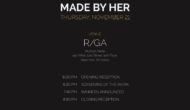KIM LONGINOTTO’S FILM “DREAMCATCHER” (2015)

Brenda Myers Powell (in scene a from Dreamcatcher)
Following its recent win at the 2015 Sundance Film Festival, Showtime has announced that Kim Longinotto's latest film, "Dreamcatcher," will premiere on the network on March 27th at 9 pm ET/PT. The film is an inspirational portrait of Chicago's Brenda Myers-Powell whose Dreamcatcher Foundation fights to end human trafficking and prevent the sexual exploitation of at-risk youth.
"Dreamcatcher" recently made its world premiere at the 2015 Sundance Film Festival as part of the World Cinema Documentary section. The documentary won the World Cinema Directing Award honoring the work of veteran documentarian Kim Longinotto. "Dreamcatcher" focuses on Brenda Myers-Powell, a former Chicago prostitute who helps women and teenage girls break the cycle of sexual abuse and exploitation. The film lays bare the hidden violence that devastates the lives of young women, their families and the communities where they live. Armed with an overwhelming personality and unflinching focus, Brenda established The Dreamcatcher Foundation, which helps women and girls acquire the tools they need to leave the sex industry.
I like to think of Kim Longinotto's films as gangster movies. Only, instead of giving violent men the limelight, Kim's protagonists are the women who fight back against the men – the kind of women you wouldn't dare fuck with.
Take Kim's 2008 documentary, Rough Aunties, which won the Sundance documentary award for its portrayal of the "Bobbi Bears", a gang of five women in South Africa who look after abused and abandoned children. Or 2010's Pink Saris, the story of Sampat Pal, a formidable vigilante taking on India's endemic rape problem. You could say that, throughout her prolific career as a documentarian, Kim's always championed the female as the underdog.
"It's not really about the oppression of women," says Kim. She's not keen on that word. She says she doesn't like films about victims – watching or making them.
"Take Sampat Pal," Kim starts. "She's quite dour, she's full of anger and she's quite damaged – but she's not a victim. She was a woman with nothing, no money and no education, who triumphed over it, and is now helping other people and breaking all the rules. If you think about it like that, these stories are about rebels, and those rebels are usually women, because, in most situations, men have an awful lot more power."
Kim Longinotto and Brenda Myers-Powell
British-born, Kim started making films in the late 1970s, when she attended the National Film and Television School in London. The first film that really got people talking was Shinjuku Boys, a sensitive look at Tokyo's female-to-male transgender community and a nightclub that only counts trans boys among its staff. Unlike her good friend and contemporary Nick Broomfield, Kim doesn't appear in her own films. She is softly spoken and, by her own admission, quite scruffy.
Kim's new documentary, Dreamcatcher, the story of Brenda Myers, an ex-prostitute and crack cocaine addict turned role model and councillor, is much like Sampat Pal, the protagonist of Kim's earlier film "Pink Sari's," they are both survivors. To set everything up near the opening of Dreamcatcher, Brenda recalls the time a John attempted to cut her face with a blade, setting a precedent for the shocking accounts of violence that pervade the film; murderous pimps, systemic child abuse and drug-related crime all feature.
Kim was homeless herself at one time, and empathises with Brenda's situation: "A lot of people who've been down and out in different ways want to deny it or move on," she tells me. "Probably the hardest thing in the world is to admit to being an ex-prostitute for 25 years, whereas Brenda doesn't care. She's now living in the suburbs, she's got a job in the jails and she's got a husband."
"A lot of women would think, 'I want to be respectable now. I don't want people to know about my past. I'm going to reinvent myself and work in a bank, or something.' But Brenda isn't doing that; she's constantly telling these girls she's one of them. And I love her for that."
Brenda conducts her outreach work under the banner of The Dreamcatcher Foundation, which she founded in 2008 to aid women and girls and fight human trafficking in Chicago. Today, Brenda holds seminars for female sex workers in prisons, as well as talking to "high-risk" girls in inner-city schools. The foundation also owns a van, which Brenda and her colleagues drive around downtown Chicago at night, offering girls on the streets everything from condoms to a support network, should they want to quit drugs or leave the game.
The opening scene of Kim's documentary shows Brenda talking at length to the girls she pulls into her van off the street. Kim and her producer, Lisa Stevens, are right there in the conversation, their camera unflinching, as one women recalls multiple stabbings from a client, followed by another young sex worker talking about her homelessness and crack addiction. There is no other film that listens so calmly and intently to the critically underrepresented voices of women.
Kim Longinotto: Brenda uncovers the secrets and lies passed down from generations in her community. The film shows girls and young women having the courage to change their lives by finally challenging a culture of silence and denial.
Kim Longinotto: Films are journeys and there are always obstacles to face. They seem horribly tough and impossible at times. But the thing is, you're a part of a team. By far my favorite bit is the editing. You have everything you need, so all the heart-wrenching pressure is off. I enjoy watching Ollie work and the film taking shape. Some editors don't like you being in the room all the time so I'm very lucky to work with him. I also learn a lot about how to make my camerawork easier to edit, so that he won't have any problems and the scenes can flow freely.
Kim Longinotto: I used the Sony PDW 800. I really value this camera. No problems with it at all. I asked a friendly technician, Lee Elphick, to set the menu for me as I'm really bad with all that stuff. It's really good in low light and the other images are fab too. People often say that smaller cameras give you more access. I think that's rubbish. It's our job to make the camera just an extension of what we're doing.
Kim Longinotto: Teddy Leifer was able to raise the money. But we did do The Good Pitch in Chicago. I wasn't very successful at all as I was truly terrible at pitching. I was also bad at pitching at the BBC as they asked me if it would be a good film and how it would be different from other films on the same subject. I foolishly admitted, "I don't know."
Kim Longinotto: I really want people to feel that it opens a window into their own experience; to see things differently in their own lives. I know it changed me and made me able to re-visit feelings hidden in my past. I hope they'll be inspired by Brenda's story and also relate to the other people in the film. It's a film about change and we all need to find the courage to move forward in our lives and learn from our mistakes.
Kim Longinotto: I always worry straight after making a film, that it will be my last. I have to desperately want to do something to have the courage to embark on a new one. I'm addicted to the terror and passion of making a film.



